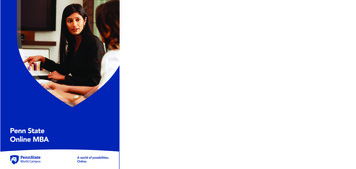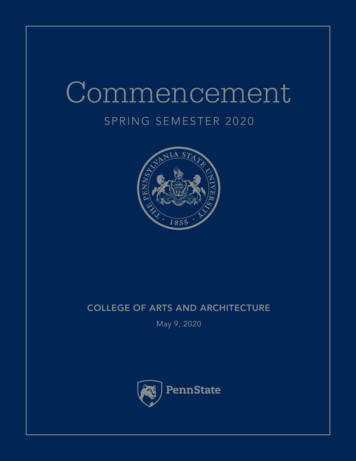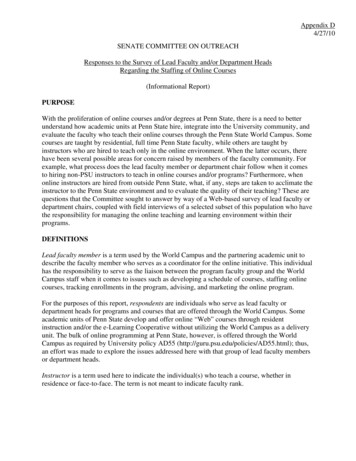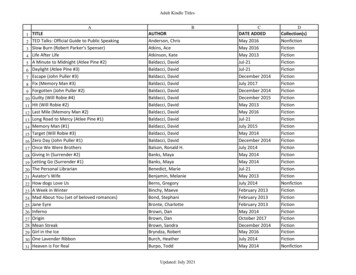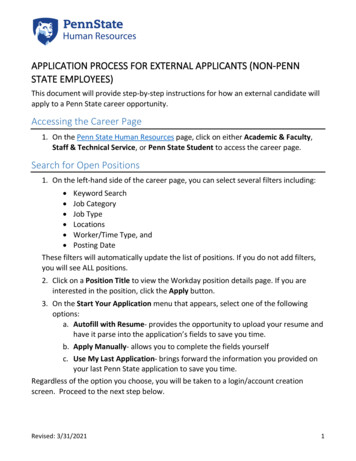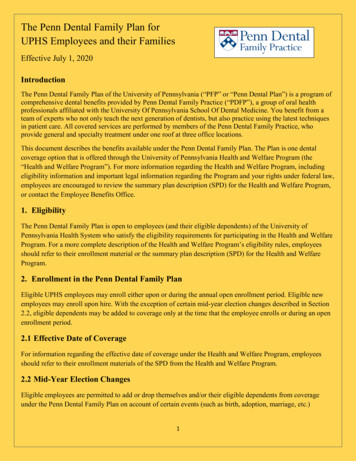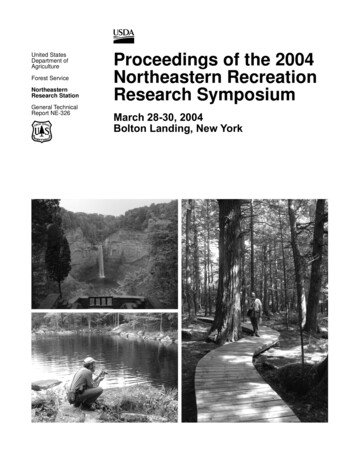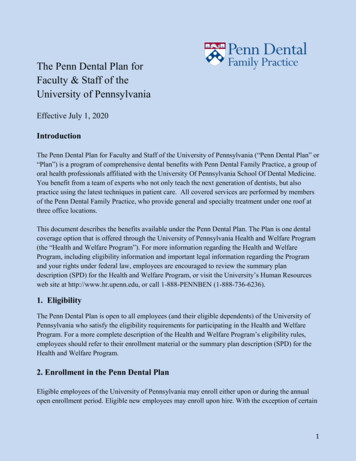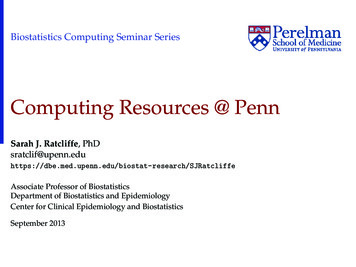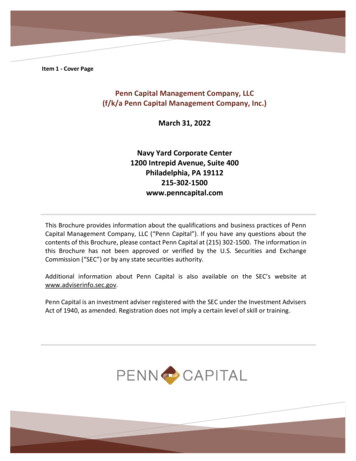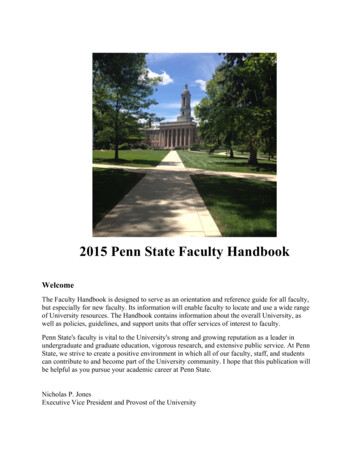
Transcription
2015 Penn State Faculty HandbookWelcomeThe Faculty Handbook is designed to serve as an orientation and reference guide for all faculty,but especially for new faculty. Its information will enable faculty to locate and use a wide rangeof University resources. The Handbook contains information about the overall University, aswell as policies, guidelines, and support units that offer services of interest to faculty.Penn State's faculty is vital to the University's strong and growing reputation as a leader inundergraduate and graduate education, vigorous research, and extensive public service. At PennState, we strive to create a positive environment in which all of our faculty, staff, and studentscan contribute to and become part of the University community. I hope that this publication willbe helpful as you pursue your academic career at Penn State.Nicholas P. JonesExecutive Vice President and Provost of the University
About the Faculty HandbookThis handbook is intended for use as a general reference rather than the official source ofUniversity policies and guidelines. The Faculty Handbook is not intended to be definitive onpolicy matters, nor does it grant substantive contractual rights to University employees. Nothingcontained herein shall negate the right of the University to augment or change its policiesapplicable to University employees. If you have questions about a particular issue, be sure toconsult your department head, human resources representative, director of academic affairs, ordirector of business services. You can obtain from them the most recent copy of the relevantUniversity policy.We hope that this handbook will be useful to you. Revisions and suggestions for future editionsare welcome and should be forwarded to the Executive Vice President and Provost of theUniversity, 201 Old Main.This publication is available in alternative media on request.Statement of NondiscriminationThe University is committed to equal access to programs, facilities, admission, and employmentfor all persons. It is the policy of the University to maintain an environment free of harassmentand free of discrimination against any person because of age, race, color, ancestry, nationalorigin, religion, creed, service in the uniformed services (as defined in state and federal law),veteran status, sex, sexual orientation, marital or family status, pregnancy, pregnancy-relatedconditions, physical or mental disability, gender, perceived gender, gender identity, geneticinformation, or political ideas. Discriminatory conduct and harassment, as well as sexualmisconduct and relationship violence, violates the dignity of individuals, impedes the realizationof the University’s educational mission, and will not be tolerated.Direct all inquiries regarding the nondiscrimination policy to:Dr. Kenneth Lehrman IIIVice Provost for Affirmative ActionAffirmative Action OfficeThe Pennsylvania State University328 Boucke BuildingUniversity Park, PA 16802-5901Email: kfl2@psu.eduPhone: 814-863-04712
ContentsWELCOME . . . . . . . . . . . . . . . . . . . . . . . . . . . . . . . . . . . . . . . . . . . . . . . . . . . . . . . . 1ABOUT THE FACULTY HANDBOOK . . . . . . . . . . . . . . . . . . . . . . . . . . . . . . . . . 2STATEMENT OF NONDISCRIMINATION. . . . . . . . . . . . . . . . . . . . . . . . . . . . . 2INTRODUCTION . . . . . . . . . . . . . . . . . . . . . . . . . . . . . . . . . . . . . . . . . . . . . . . . . . . 6I. THE PENNSYLVANIA STATE UNIVERSITY . . . . . . . . . . . . . . . . . . . . . . . . . 7GovernanceAcademic and Research UnitsAcademic and Research Support ServicesUniversity OutreachExternal RelationsII. ACADEMIC POLICIES . . . . . . . . . . . . . . . . . . . . . . . . . . . . . . . . . . . . . . . . . . . 18Academic FreedomAcademic AppointmentsSpecial Faculty TitlesService Plans and Payroll InformationFaculty ServicePromotion and TenureEvaluation of Faculty PerformanceEnglish FluencyFaculty DevelopmentDispute ResolutionLeaves of AbsenceRetirement and Resignation3
III. INSTRUCTION . . . . . . . . . . . . . . . . . . . . . . . . . . . . . . . . . . . . . . . . . . . . . . . . . 31Undergraduate EducationThe SyllabusInstructional Resources and InformationGraduate EducationAdministrative GuidelinesIV. RESEARCH, SCHOLARSHIP, AND CREATIVE ENDEAVORS . . . . . . . . . . 42The University's Research ProgramResearch AdministrationTechnology TransferResearch Policy IssuesOffice for Research ProtectionsV. BENEFITS AND PERSONNEL POLICIES . . . . . . . . . . . . . . . . . . . . . . . . . . . . 50Mandatory ProgramsVoluntary ProgramsWorkers' CompensationLiability Insurance CoverageUnemployment CompensationHuman Resources ServicesDisability Services for FacultyPersonnel PoliciesTransportation and ParkingPUBLICATIONS OF INTEREST AND SOURCES OFFURTHER INFORMATION . . . . . . . . . . . . . . . . . . . . . . . . . . . . . . . . . . . . . . 61Academic Catalogs4
Teaching, Advising, and Curricular InformationPolicies, Procedures, and GuidelinesEmployee BenefitsInstitutional Facts and InformationDirectories and MapsNewsletters and PeriodicalsPublic Broadcasting (University Park campus)Student Newspapers (University Park campus)APPENDIX 1. UNIVERSITY COLLEGE . . . . . . . . . . . . . . . . . . . . . . . . . . . . . . . . 66CampusesAssociate and Baccalaureate DegreesCollege Administrative and Academic StructureCampus Administrative StructureCampus Faculty Organizations5
IntroductionAlthough you will probably form your closest relationships with colleagues in your immediateunit, the University community as a whole provides a context for your academic life at PennState. Every faculty member's situation is an individual one, varying according to theexpectations of the academic discipline, the priorities of the department, and the specialcharacteristics of each campus. However, all faculty share common interests and needs. Thepurpose of this handbook is to present information relevant to the concerns of all faculty, and tolead you to sources of further information.As a faculty member, you have an important role in providing intellectual leadership within theUniversity. You are likely to be engaged in a wide range of activities--teaching classes,conducting research, creating original artistic works, attending committee meetings, participatingnationally and internationally in activities within your discipline, and undertaking other forms ofacademic involvement within the University and with colleagues elsewhere. Faculty members,especially those who are entering tenure-eligible positions, naturally want to know what isexpected of them and how their work will be evaluated. Of the many types of activities, whichones are the most productive for a particular faculty member?All faculty members should discuss their plans with their department head or other unitadministrator and with senior colleagues. These discussions should be held early and frequently.This allows you to invest your time and energy in a way that fits the needs or priorities of youracademic unit, as well as your own professional development.In addition to an annual evaluation, tenure-track faculty members receive a formal review in thesecond, fourth, and sixth years, if their appointment is continued. The final tenure decision isnormally made in the sixth year. Both at the unit (department and/or campus) level and at thebroader levels of the college and University reviews, faculty performance is assessed in thefollowing three categories: (1) the scholarship of teaching and learning; (2) the scholarship ofresearch and creative accomplishments; (3) service and the scholarship of service to theUniversity, society, and the profession. Further information about these categories ofperformance is found in this handbook and in University Policy HR23.Much of the information contained in this handbook applies to one or more of these performancecategories. In addition to a general description of the University, the handbook contains sectionson academic policies, including promotion and tenure; instruction; research; and benefits andpersonnel policies. Read the handbook carefully, attend informational workshops whenavailable, and keep in close touch with your colleagues.The Faculty Handbook is intended for use as a general reference rather than the official source ofUniversity policies and guidelines. The Faculty Handbook is not intended to be definitive onpolicy matters, nor does it grant substantive contractual rights to University employees. Nothingcontained herein shall negate the right of the University to augment or change its policies6
applicable to University employees. If you have questions about a particular issue, be sure toconsult your department head, human resources representative, director of academic affairs, ordirector of business services. You can obtain from them the most recent copy of the relevantUniversity policy.Suggestions for future editions of the Faculty Handbook are welcome and should be forwardedto the executive vice president and provost of the University, 201 Old Main.I. The Pennsylvania State UniversityThe Pennsylvania State University, a major multicampus institution serving all regions of theCommonwealth, is devoted to learning and service enlightened by vigorous research andscholarship. As a land-grant university, Penn State is expected to extend high-quality teaching ina wide array of undergraduate and graduate programs in the arts, humanities, and sciences, aswell as a balanced offering of programs in professional and technical disciplines. As a majorresearch university, Penn State accepts the dual responsibility to excel and to serve both thepublic and private sectors of society. Penn State is a state-related university; the Universityreceives an annual appropriation from the Commonwealth, but is governed by its own Board ofTrustees.GOVERNANCEBoard of TrusteesThe Board of Trustees of Penn State is the corporate body established by its charter withcomplete responsibility for the governance and welfare of the University. To execute thisresponsibility, the authority for day-to-day management and control of the University and forestablishing policies and procedures for the educational program and other operations of theUniversity is delegated to the President. The President delegates certain responsibilities to thefaculty and also consults with the faculty and the student body on other matters in accordancewith the general directives of the board. The board, however, is the final repository of all legalresponsibility and authority to govern the University under the Nonprofit Corporation Law ofPennsylvania.Office of the PresidentThe President of the University is the chief executive officer, responsible to the Board ofTrustees for the operation of the University. The executive vice president and provost of theUniversity is the chief academic officer, responsible to the President. Together, these officersconstitute the Office of the President, which is designed to integrate and coordinate theresponsibilities of both officials in the management of the University.7
The senior vice presidents for development and alumni relations, finance and business, andhealth affairs, and the vice presidents for outreach, research, student affairs, and universityrelations, report to the President. In the absence of the President, these administrative officersreport to the executive vice president and provost of the University. The vice president forCommonwealth Campuses, academic deans and academic support officers report to the Office ofthe President through the executive vice president and provost of the University.Academic Leadership CouncilThe Academic Leadership Council functions under the authority of the President and providesadvice and counsel on academic matters to the President and the executive vice president andprovost of the University. The chair is elected by the council.University Faculty SenateThe University Faculty Senate has three main functions:--to serve as the sole legislative body representing the University faculty as a whole;--to act as an advisory and consultative body to the President, both through its corporate wholeand any of its constituent parts, on any matter that may affect the attainment of the educationalobjectives of the University;--to serve as a forum for the exchange of ideas among the members of the University faculty.In addition to its legislative role, the senate provides an opportunity for any senator to discussany matter thought to be of concern to the University. University faculty, administrators, andstudents who are not members of the senate may request permission to speak on any item ofbusiness already before the senate. Senate membership includes faculty representatives electedfrom each academic unit as well as representatives from the administration and the student body.Further information is available in the Constitution, Bylaws, and Standing Rules of theUniversity Faculty Senate, the Faculty Senate Web site www.psu.edu/ufs/, or from the Office ofthe University Faculty Senate, 814-863-0221, 101 Kern Graduate Building.ACADEMIC AND RESEARCH UNITSPenn State University ParkThe University Park campus, located in Centre County, is the administrative center of theUniversity. It is the primary site for graduate study and enrolls about half of all Penn Stateundergraduates. The University Park campus also houses most of the University's major researchfacilities, both those within colleges and those contained in intercollege research units. Based onan index developed by the Association of Research Libraries, the University Libraries, with their8
central administration at the University Park campus, rank among the top 10 research libraries inthe United States and Canada. The campus also is the home of the Palmer Museum of Art andthe Center for the Performing Arts.Fourteen academic units confer degrees at the University Park campus: the Colleges ofAgricultural Sciences, Arts and Architecture, Smeal College of Business, Communications,Earth and Mineral Sciences, Education, Engineering, Health and Human Development,Information Sciences and Technology, the Liberal Arts, Nursing, Eberly College of Science, theGraduate School, and Penn State Law. Faculty at all Penn State campuses are members of theseacademic units.Penn State AbingtonPenn State Abington, founded in 1950, is located in Montgomery County on a beautiful suburbansite a few miles north of the Philadelphia city limits. Penn State Abington offers acomprehensive collegiate experience in a small college environment.Penn State AltoonaPenn State Altoona was established in 1939 and became a baccalaureate, degree-granting college in1997. Its mission is to provide a comprehensive undergraduate educational experience for studentsseeking a Penn State opportunity in a residential, small-campus environment.Penn State BerksPenn State Berks, founded in 1958, is located in Berks County on a 258-acre rural site nestledagainst commercial areas just outside of Reading. The college offers associate degrees,baccalaureate degrees, and a variety of certificate programs.Penn State Erie, The Behrend CollegePenn State Erie, The Behrend College, is a residential college offering 35 bachelor’s degrees,four master’s degrees, and four associate degrees. Students can also complete the first two yearsof most other baccalaureate degree programs offered by the University.Penn State HarrisburgPenn State Harrisburg, located in Middletown, is an undergraduate college and graduate school,offering associate, baccalaureate, master's, and doctoral degrees. Penn State Harrisburg alsooffers the first two years of study leading to more than 160 Penn State undergraduate majorsavailable throughout the Commonwealth.9
University CollegeThe University College comprises fourteen campuses located across the Commonwealth ofPennsylvania: Beaver, Brandywine, DuBois, Fayette, Greater Allegheny, Hazleton, LehighValley, Mont Alto, New Kensington, Schuylkill, Shenango, Wilkes-Barre, WorthingtonScranton, and York.For more information about the degree programs offered and the organization of the UniversityCollege, refer to Appendix 1.Schreyer Honors CollegeThe Schreyer Honors College is a University-wide honors program for academically superiorundergraduate students. It does not confer degrees, but provides a diploma notation. Admissionis highly competitive. Schreyer Scholars from all of Penn State's academic colleges pursueenriched honors study and research, as well as a wide selection of international and serviceopportunities.Law SchoolsLegal education at Penn State embraces the University’s mission to improve the lives of thepeople of Pennsylvania, the nation, and the world through legal teaching, scholarship, andservice. Law is the foundation of social order and prosperity. Penn State trains students topractice law at the highest level in an increasingly global world through a rigorous course ofstudy including both classroom-based and clinical learning. Our faculty and staff reflect diverselife experiences and ideas. We understand the important role lawyers play in the administrationof justice and are committed to meaningful diversity among our students.Starting with students enrolling in fall 2015, Penn State will offer two law schools – DickinsonLaw and Penn State Law – each with a distinct mission.Penn State Great Valley School of Graduate Professional StudiesThe Penn State Great Valley School of Graduate Professional Studies is a special-missioncampus of the University, providing graduate programs and continuing professional educationfor adults in southeastern Pennsylvania.College of MedicineThe College of Medicine is located on the campus of Penn State Milton S. Hershey MedicalCenter in Hershey. The College of Medicine offers degree programs in anatomy, biochemistryand molecular biology, bioengineering, cell and molecular biology, genetics, homeland security,immunology and infectious diseases, integrative biosciences, laboratory animal medicine,10
microbiology and immunology, molecular medicine, molecular toxicology, neuroscience,pharmacology, physiology, and public health sciences.Penn State Hershey Medical Center is recognized as one of the nation's premier academic healthcenters, recruiting faculty members who are internationally known for their accomplishments inresearch, education, and patient care.Pennsylvania College of TechnologyPennsylvania College of Technology is an affiliate of the University as a wholly ownedsubsidiary to the Corporation for Penn State, but maintains its own mission, goals, and board ofdirectors. Admission and administrative policies are set by Penn College and may differ fromthose of Penn State.Penn College is a special mission affiliate of Penn State, committed to applied technologyeducation. Partnerships with business and industry are a key ingredient of Penn College's"degrees that work." Unique bachelor's and associate degree majors, as well as specializedcertificate programs, focus on applied technology and provide students the opportunity to workon projects that combine hands-on experience with theory and management education related totheir field of study.ACADEMIC AND RESEARCH SUPPORT SERVICESUniversity LibrariesThe University Libraries constitute a major resource for students and researchers in all fields ofstudy. The Libraries rank among the top ten research libraries in North America by theAssociation of Research Libraries.The Libraries include a central facility and five other libraries at University Park campus, pluslibraries at other Penn State locations throughout the state. At University Park, the Arts andHumanities, Business, Education and Behavioral Sciences, Social Sciences, Maps, Life Sciences,Special Collections, and News and Microforms libraries are maintained in Pattee Library andPaterno Library. Other Libraries at University Park include the Architecture and LandscapeArchitecture Library, Earth and Mineral Sciences, Engineering, Law, and Physical andMathematical Sciences libraries.Faculty members may recommend books and other library material purchases by contacting theLibraries directly at .cfm or through the facultymember in their department who serves as the library representative. Libraries subject specialistsare listed on the Web at tml. Faculty atlocations other than University Park can also contact their head librarian.Access to holdings is obtained through The CAT, a computerized catalog available on the Webat www.libraries.psu.edu. The CAT is a dynamic, integrated information system that provideselectronic access to a great variety of materials in many subject areas. LionSearch, available on11
the Libraries' homepage, offers a single search box function for library resources, includingbooks, articles, newspapers, databases and more.The Libraries maintain a comprehensive program of general and specialized reference andinstructional services. The Libraries' faculty teach credit courses as part of the Library StudiesProgram and offer a variety of topical seminars. Introductory sessions, offered by LibraryLearning Services, are scheduled on a regular basis to familiarize faculty, students, and otherlibrary users with library resources. Class sessions designed for specific courses can be arrangedin the library to help students learn how to find, use, and evaluate relevant books, articles, Websites, and other information resources. Assistance is available to help design assignments that uselibrary resources to enhance student research skills and critical thinking. Library instructionrooms (hands-on labs or traditional classrooms) can be reserved for on-site instruction in the useof library resources. For information, go to: www.libraries.psu.edu/psul/lls.html.Media and Instructional SupportMedia and Technology Support Services (MediaTech), a division of the University Libraries,assists with the design of technology classrooms, and can provide information anddemonstrations for data projectors, video switching systems, audio systems and cabling. There isa recording studio at MediaTech's office at Wagner Annex that can be reserved for producingvideo/audio and photographic projects. Phone: 814-865-5400.Information Technology ServicesInformation Technology Services (ITS) ensures that faculty, students, and staff have theinformation technology tools and infrastructure necessary to carry out the University's mission.ITS is working to achieve five broad goals: help faculty improve the way education is delivered;provide students with resources to enrich their educational experience; create and sustain anenvironment that enables leading-edge research; help to improve productivity; and establish theinformation technology infrastructure necessary to maintain Penn State's prominence inintegrating high-quality programs in teaching, research, and outreach. For additional information,see its.psu.edu on the Web.Statistical Consulting CenterThe Statistical Consulting Center (SCC) is a team of faculty, staff, graduate, and undergraduatestudents in Statistics. We provide advice, project management and statistical analysis forresearch projects in collaboration with the University and industry communities. Service consistsof long-term, contract-based consulting with faculty and external constituents, short-termconsulting services for Penn State graduate students, and Stat-on-Call (one hour) consultingservices. Penn State graduate students are entitled to two short-term visits and one hour of Staton-Call free of charge. However, the SCC does not consult on class assignments.The Statistical Consulting Center is located in 323 Thomas Building, University Park.University Arts Services12
Each of the units of University Arts Services is an educational and artistic resource for theUniversity and the Commonwealth. The Center for the Performing Arts presents a diverse seriesof professional arts programming and a full spectrum of professional arts management servicesto other University producing and programming agencies. The Palmer Museum of Art has thespecial responsibility for developing and preserving a permanent collection of works of art thatdemonstrate the broad sweep of art history from ancient civilizations through contemporarytimes. Temporary exhibitions reinforce the strength of the collection and support instructionalprograms. Penn State Centre Stage is the professional arm of the School of Theatre. Eachsummer, students, faculty, and staff from Penn State work alongside guest artists to create andpresent first-class professional productions, including musicals, comedies, mysteries, andmodern classics. These productions augment the extensive production season presented by theSchool of Theatre during the fall/spring academic year. The School of Music offers a wealth ofconcerts and special events featuring faculty and guest artists, as well as student soloists andensembles. Bringing superior performance of music at low or no cost to campus audiences,School of Music concerts are held throughout the year in Esber Recital Hall and other campuslocations.University Office of Global ProgramsThe University Office of Global Programs (UOGP) provides support and oversight for all ofPenn State's international engagements. The office oversees education abroad programs; hostsinternational students, scholars, and international visitors; and provides support for theUniversity's international partnerships and collaborations around the world.Advisory Groups and BoardsAdvisory groups exist in every academic and research unit of the University. These groupsreview programs, make recommendations, and provide valuable guidance and input to help theunit reach its goals.The advisory boards at the Commonwealth Campuses, established under policies and proceduresset forth by the University's Board of Trustees, make recommendations concerning matters offinancing, programming, and public relations affecting their respective campuses. They organizesupport for capital financing of the campus and participate in the control of the program ofacquisition, construction, or repair of physical facilities as available funding permits. Theadvisory boards make recommendations through the chancellors to the vice president forCommonwealth Campuses concerning matters of importance to the local community.UNIVERSITY OUTREACHPenn State Outreach extends the intellectual expertise and resources of the University throughteaching, research, and service to address the social, civic, economic, and environmental issuesand opportunities of our Commonwealth, nation, and world. Working closely with faculty in all13
the academic colleges and campuses, the University delivers outreach programs and services atconvenient times and accessible locations through Cooperative Extension, Continuing Education,Distance Education (World Campus), and Penn State Public Broadcasting. Universityscholarship is shared through print; video and multimedia; the internet; on-site courses andcertificate programs for credit; online credit certificates and degree programs; conferences;institutes and seminars; symposia; continuing professional education; and managementdevelopment programs and services. Outreach also works with faculty and academic units tofoster engaged scholarship initiatives that address key societal issues. The vice president forOutreach, in collaboration with the University Council on Engagement and the Faculty SenateCommittee on Outreach, advances outreach programs and services University-wide. For moreinformation, contact the vice president for Outreach at 814-865-7581.Continuing EducationFaculty members disseminate research, provide instruction, and extend their scholarship throughContinuing Education programs at all Penn State locations. Each college dean or campuschancellor is responsible in partnership with Outreach for Continuing Education in his/hercollege or campus. The academic department serves as the basic unit for outreach activities.Faculty members are encouraged to develop and deliver credit and noncredit ContinuingEducation courses; certificate, diploma, and licensure programs; conferences, workshops,symposia, and teleconferences. The work of faculty is supported by the associate vice presidentfor academic outreach. For more information, contact the associate vice president for academicoutreach at 814-863-6726.World Campus/Distance EducationFor more than a century, distance education has helped Penn State serve learners nationally andinternationally. Distance Education programs involve teaching and learning relationships wherestudents and instructors are geographically separated and communication between them occursthrough technical media (e.g., radio, television, audio, video, computer, and correspondence). In1998, Penn State took that tradition into the twenty-first century by creating a World Campusthat uses technology to create global learning communities around some of the University's bestand most respected academic programs. In partnership with the academic colleges, the WorldCampus seeks to ensure access to Penn State’s academic resources, particularly by adult learners,and to extend the University’s academic programs nationally and internationally. For moreinformation, contact the executive director of the World Campus at 814-863-6726.Conferences and InstitutesFaculty are encouraged to disseminate research through conferences, institutes, workshops,seminars, symposia, and short courses. Colleges are responsible for program content and forinstructional staff. Staff from the Conferences and Institutes and Continuing Education offices atall Penn State locations support development and delivery of these programs. Professionalplanners assist faculty in offering conferences, workshops and institutes. Penn State Conferenc
Penn State's faculty is vital to the University's strong and growing reputation as a leader in undergraduate and graduate education, vigorous research, and extensive public service. At Penn State, we strive to create a positive environment in which all of our faculty, staff, and students can contribute to and become part of the University .
